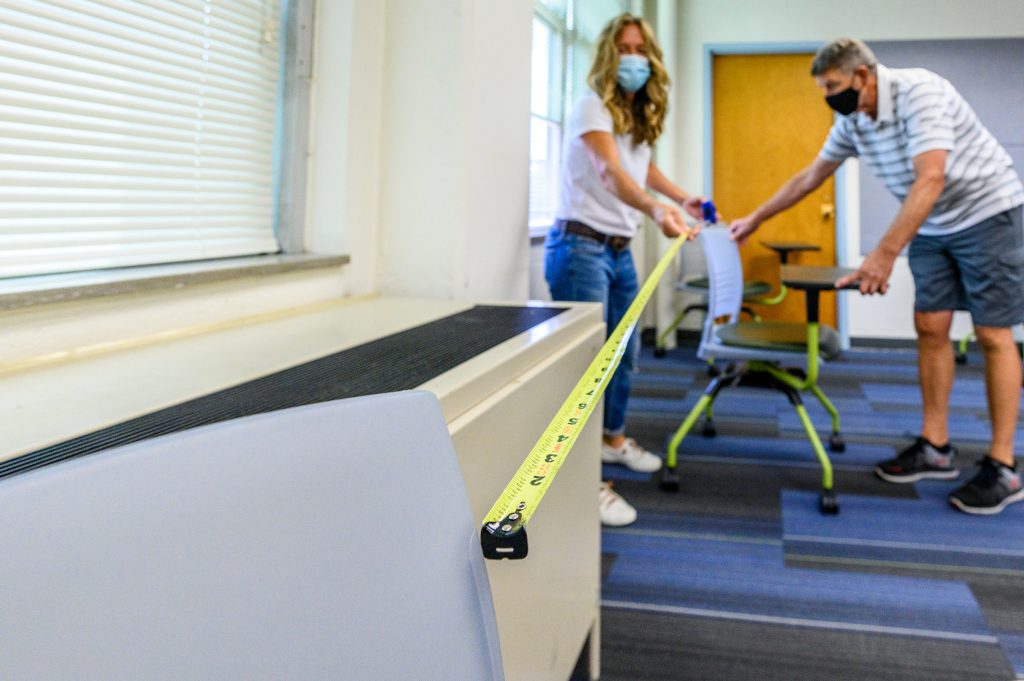
By Emily Knepple
The uncertainty of bringing students back to campus during COVID-19 raised questions surrounding what the semester would look like for the UW-Madison community in the fall. The UW-Madison School of Journalism and Mass Communication has been working hard to give their students a chance to stay engaged with a wide range of course material, whether in person or virtually.
One of the J-School’s most infamous courses, J202: Mass Communication Practices, serves as the introduction course for all newly-admitted students. Structured with a three-hour lab twice a week and a 75-minute lecture, this course can help students create a community within the J-School and learn the basics to help them throughout their time in the School.
This year, the course is taught by Professor Lucas Graves, who worked alongside past course instructors and the lead TA for the fall semester, Matt Minich. As a team, the group met to strategize how they could replicate the class virtually.
“You have to adapt the courses, you can’t really flip a switch and turn a course online,” Graves said in response to the time spent over the past few months trying to creatively deliver this course virtually. J202 is now divided into individual modules, the beginning of the course teaches students the basics before heading into their final project.
Graves also teaches a graduate student seminar that he admits was easier to switch to virtual than J202. After establishing norms and addressing the obvious challenge of virtual learning, the class moved forward smoothly and Graves says he’s happy with how it turned out, although he misses being in person.
When COVID-19 initially began to alter college campuses in March, courses had the benefit of having been in person for long enough that students might know their classmates better than an entirely virtually course. Graves shared that SJMC Professor Stacy Forster, who had been the professor of J202 this past spring, worked with both Graves and Minich to create J202 online.
Forster currently teaches two courses in the J-School—J345: Principles and Practice of Strategic Communication and J417: Magazine Publishing. Forster shares that throughout the summer, she thought long and hard about the best way to bring her classes to life.
J345, which focuses on the basics of strategic communication, is majorly group-based, with a final project developed throughout the semester as groups work together as a mock ad-agency.
J417 creates CURB magazine, which is written, designed and published by students and distributed to approximately 10,000 UW-Madison alumni. J417 “requires a lot of people pulling a lot of moving parts together,” Forster shared.
Forster decided to have both classes meet one day in person and the other online. Due to the University’s efforts to minimize the spread of COVID-19, Forster’s classes were generally small in numbers but set to happen in bigger lecture halls. This allowed her to plan her power lectures in person and allow students to spend time together virtually in breakout groups.
Over the summer, faculty were encouraged to have a backup plan so Forster was not completely stunted by the two-week halt of in-person instruction. She also gives credit to her students for being flexible with the on-and-off again reality of this semester.
“The students, in both classes, were super on the ball and able to adapt and kind of rolled with it in a way that kept everything pretty seamlessly. The students deserve a bunch of a credit,” Forster said.
The J-School continues to task their students with responding to real-world situations in both an ethical and innovative manner. Although losing the in-person component of class can delay relationships and provide new obstacles, it also shows students how the industry can react to things, specifically a pandemic that has altered media and the world as we know it.
Some students see this as an opportunity to learn new techniques and better understand the role journalism plays in our society.
“Although having class online is challenging and different, it’s pretty rewarding to see the real influence and impact of what I am currently studying play out in the real world,” said junior Zoe Klein. “Now more than ever, we need innovative thinkers and I feel like all of my journalism classes, which are remote, are teaching me new ways to think and helping me learn how to respond to crisis.”